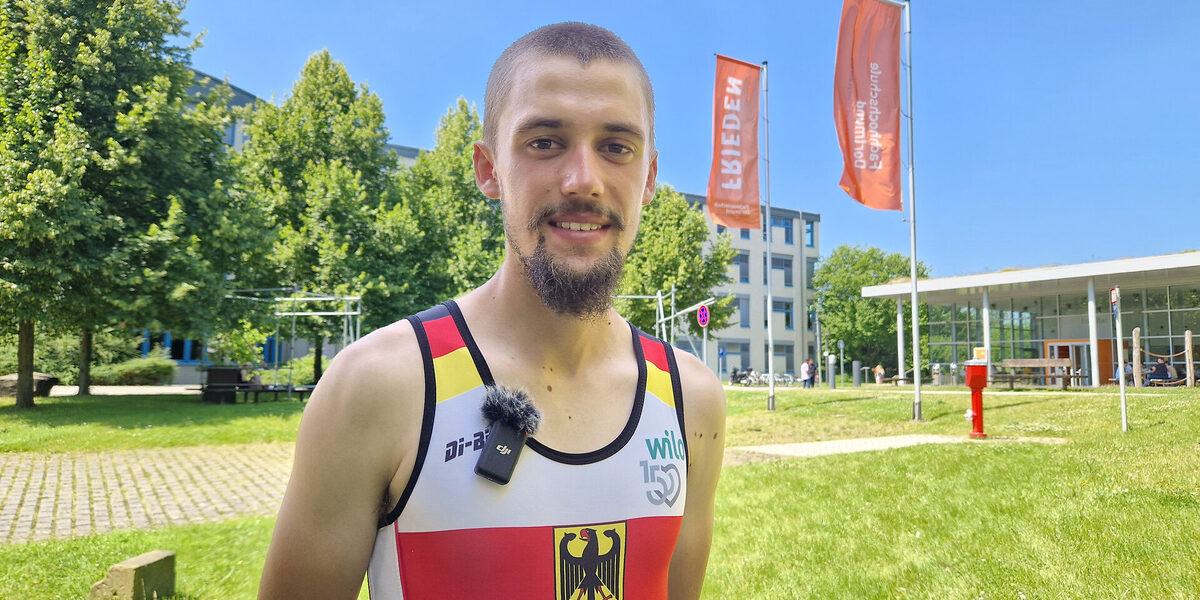Everyone on board listens to his command: as a coxswain, UAS student Florian Koch not only has to keep rowing boats on course, but also put his teams on the road to success with tactical announcements - as he is currently doing at the 2024 World University Championships in Rotterdam.
The 23-year-old is studying computer science at Fachhochschule Dortmund. He has also been a coxswain in the U23 section of the German national rowing team since 2019. He will also be competing at the World University Championships (WUC) in Rotterdam from July 4 to 6, 2024: with a women's eight, which he will be coxing, and a women's four, which he will be coaching. He was officially nominated by the board of the German University Sports Association (adh).
At student level, the WUCs are regarded as outstanding competitions with a high international level: at these top events, which take place every two years, top athletes aged 25 or under and studying at universities in the countries represented compete. "The aim is of course to represent Germany in the best possible way, to qualify for the final in the races and, ideally, to win a medal," says Florian Koch.
"My path to rowing was more of a coincidence back then - because it was only a short way to a rowing club in my home town of Ingolstadt on the Danube in Upper Bavaria," says the young athlete about his beginnings in 2012, when he first familiarized himself with the correct rowing movements. Since then, he has worked on his sporting career with great enthusiasm, building up his skills as a coxswain and coach. He has already celebrated numerous successes, with particular highlights including 2020, when he and his team became European champions, and 2023, when they won bronze at the World Championships.
55 kilograms as the limit
Florian Koch is 1.67 meters tall and weighs 50 kilograms. "On the day of the competition, the limit per person is 55 kilograms. If someone weighs less, this is compensated for on board with sand so that all boats have the same total weight," he explains. As coxswain, he sits at the back of the boat, keeping an eye on the rowing team and holding two ropes for a small steering blade in his hands, so he is also very actively involved in the action himself. "In a way, as coxswain I'm the coach's extended arm. I take over the race tactics, see how we are doing in the race, keep an eye on the rhythm and give technical advice. What the coach would say to the team from the outside, what is not possible because of the distance and the volume, I take over."
Hard preparation is necessary for sporting success. Florian Koch manages the considerable time burden of combining his studies, several hours of training on the Dortmund-Ems Canal and participation in competitions with aplomb. He appreciates the supportive environment with the framework conditions at the university: "Sure, it's a bit stressful with the organization, but you learn to deal with it - and I can always make very flexible arrangements with the lecturers at my Faculty of Computer Science when things get tight."
Measuring system as bachelor thesis
In addition to training and competitions, Florian Koch is currently preparing his bachelor's thesis with Prof. Dr. Frank Künemund, which is thematically very obvious: he is developing a measuring system with an acceleration sensor for rowing boats. There is already a prototype with a microcontroller that records acceleration data and then enables a graphical evaluation. He is now also working on his Bachelor's thesis between training sessions directly at the rowing base in Dortmund, at the rowing performance center on the canal.
He wants to close a gap with his practice-oriented approach: "Acceleration is more difficult to record than speed. There are already measuring systems, but they are extremely expensive and complex to operate. My aim is to simplify this significantly so that it becomes manageable for individual trainers. Along the lines of: I need measurement data today, so I grab the system and put it on board." Now and again, his prototype is also on board during training sessions.
He is confident that his system will soon be ready for practical use. This could then perhaps also accelerate his career as a computer scientist. From a sporting perspective, his dream remains to be the helmsman of the German eight at the 2028 Olympics.
Update: In Rotterdam, the women's four coached by Florian Koch won a bronze medal. And the women's eight, which he steered, achieved a solid 4th place. The German University Sports Association reports more on the results(Opens in a new tab) .
